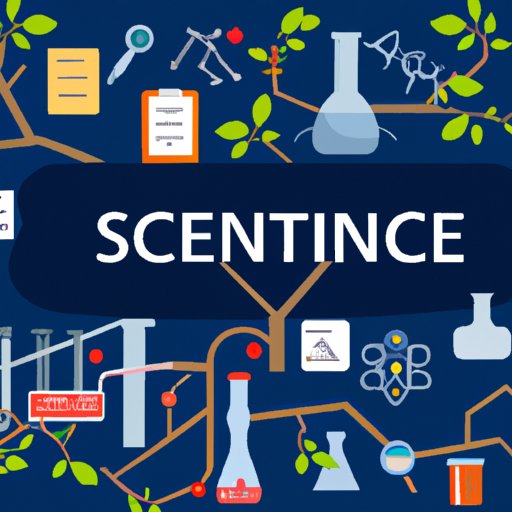Introduction
Science can be defined as a systematic process of acquiring knowledge through observation and experimentation. It is the basis for many of the discoveries and inventions that have changed the world and improved life in countless ways. In this article, we will explore the fundamentals of science, including the scientific method, mathematics, various branches of science, the importance of research and experimentation, ethical considerations, and career options.
The Scientific Method
The scientific method is a systematic approach to problem solving. It involves making observations, forming hypotheses, testing those hypotheses, and then drawing conclusions based on the results of the experiments. This process is used in all areas of science and provides a reliable way to gain new knowledge.
For example, when scientists are studying a particular organism, they may observe its behavior and then form a hypothesis about why it behaves in a certain way. They would then design an experiment to test their hypothesis and analyze the data they collect. Based on the results of the experiment, they would either accept or reject their hypothesis.
Mathematics in Science
Mathematics plays an important role in science. It is used to make sense of data, calculate probabilities, and draw conclusions about the results of experiments. It also helps scientists develop models that can be used to predict future outcomes. For instance, mathematicians have developed models that can be used to predict the motion of objects in space, the spread of diseases, and much more.
In addition, mathematics is used to identify patterns in nature and explain why certain phenomena occur. For example, physicists use mathematical equations to explain why gravity works the way it does and biologists use math to study the interactions between organisms and their environment.
Branches of Science
Science is divided into several branches, each of which has its own specific focus. These branches include biology, chemistry, physics, geology, astronomy, and psychology. Each branch of science has its own set of theories and methods that are used to study the natural world.
Biology is the study of living things, including their anatomy, physiology, genetics, and ecology. Chemistry is the study of matter and how it interacts with other substances. Physics is the study of energy and the laws of motion, while geology is the study of the Earth’s structure, processes, and history. Astronomy focuses on the study of stars and galaxies, and psychology is the study of human behavior and mental processes.
Importance of Scientific Research and Experimentation
Scientific research and experimentation are essential for progress in all areas of science. Through research and experimentation, scientists can better understand the world around them and make predictions about the future. This type of work has led to major discoveries and inventions, such as the discovery of vaccines, antibiotics, and the development of renewable energy sources.
In addition to the practical benefits of scientific advancement, research and experimentation also provide valuable insights into the fundamental workings of the universe. For example, physicists have been able to identify the basic particles that make up all matter, while biologists have uncovered the secrets of DNA and how it drives evolution. These discoveries have helped us better understand our place in the universe.
Ethical Considerations
When conducting scientific experiments, it is important to consider the ethical implications of the work. Scientists must respect human life and be mindful of the environment in which they are working. They should also ensure that they are using resources responsibly and not introducing any unnecessary risks to people or ecosystems.
In addition, scientists should strive to be open and honest about their research and findings. They should be willing to share their data and discuss their results with other scientists in order to foster collaboration and further the advancement of science.
Career Options in Science
There are many different career paths available for those interested in pursuing a career in science. Popular fields include medicine, engineering, environmental science, computer science, and biotechnology. To pursue these fields, individuals typically need to obtain a degree and/or certification in the area of their choice.
In addition, there are numerous opportunities for those who want to work in research or teaching. Most research positions require a PhD, while teaching positions typically require a master’s degree. Additionally, some positions may require special certifications or licenses depending on the field.
Conclusion
Science is an invaluable tool for understanding the world around us and making progress in all areas of life. By understanding the basics of the scientific method, mathematics, and the various branches of science, we can begin to appreciate the complexity of the natural world and the importance of scientific research and experimentation. We must also remember to consider the ethical implications of our work and be aware of the numerous career options available in the field of science.
By exploring how to do science, we can gain insight into the wonders of the world and the amazing potential of human ingenuity.
(Note: Is this article not meeting your expectations? Do you have knowledge or insights to share? Unlock new opportunities and expand your reach by joining our authors team. Click Registration to join us and share your expertise with our readers.)
